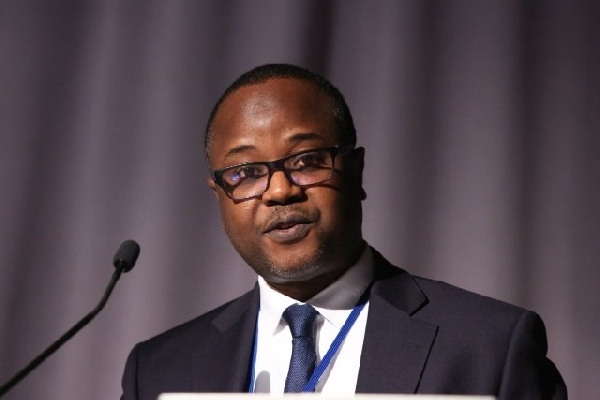Ghana’s 2.4m tax base won’t meet dev’t needs when donor love dries up – Dep. Governor
 Dr Maxwell Opoku-Afari
Dr Maxwell Opoku-Afari
Out of a population of 30 million, only 2.4 million of individual Ghanaians pay taxes, Deputy Governor of the Bank of Ghana, Dr Maxwell Opoku-Afari has said at a public lecture organised by the University of Ghana Business School on Thursday, 2 September 2021, on the theme: ‘Rethinking Development Financing: Macroeconomic Management When The Love Is Gone’.
He said Ghana’s tax revenue-to-GDP ratio is lower than Africa’s average, which is also lower compared to other regions of the world.
The tax-to-GDP ratio for Ghana has averaged 12 per cent over the past two decades, and is lower than Africa’s average of about 17 per cent in 2017, Dr Opku-Afari said.
He said this also falls short of the 25 per cent of GDP needed to give fiscal comfort and to finance development projects under the SDGs.
“This clearly highlights the inadequacy in our tax effort, calling for new measures, in particular, targeting broadening the tax base, upgrading tax policies, and revenue administration systems to mobilise more domestic revenue”, he noted.
Dr Opoku-Afari said broadening the tax base will call for getting more people to honour their tax obligations and minimisation of tax exemptions.
“Business support incentives for tax compliance should be introduced to instil the discipline in all taxpayers to honour their tax obligations”, he proposed.
“It beggars to believe that a country of over 30 million, and with over 16 million active MoMo users (an indication of economically active persons), there are only 2.4 million individual taxpayers”, he pointed out.
“Does this really show we have the capacity to deliver?” he asked, indicating: “It is not going to be possible to meet our developmental needs with such a tax base, especially when the love is gone and donor assistance has dried up”.
“It is for this reason that the recently launched Revenue Assurance and Compliance Enforcement (RACE) Initiative, is envisioned as a major transformational effort by the Government to block leakages and increase domestic revenue mobilisation, widen the tax net, and ensure compliance with tax obligations”.
“If implemented effectively and enforced, it is expected to enhance domestic revenue mobilisation and anchor the needed social contract between the government and the citizens”.
Also, he said the recent introduction of the Ghana card has invariably expanded the tax base, in that, “we now have data on more employees and entities that fall within the taxable bracket”.
“The onus is on the Ghana Revenue Authority (GRA) to reach out and bring all these people and establishments into the tax net”.
“As more people and entities are enrolled to pay tax, the per-capita tax burden could be reduced while raising the tax to GDP ratio from a larger base. As our tax to GDP ratio increases towards the Africa average and eventually to the 25 per cent, the needed fiscal space to finance our infrastructural deficit will be created. And, this is one of the most sustainable (non-debt-creating) way of financing and closing our infrastructure gap”.
Source: classfmonline.com
Trending Business

Electrical contractors call for direct government contracts to improve public safety
10:27
'The time is now': Volta Peaks CEO calls for bold government action to drive youth participation in agriculture
21:53
Leaders urge Volta youth to embrace agribusiness and entrepreneurship for regional growth
21:13
Minority urges government to tackle smuggling and protect local farmers
10:29
ADB hosts National Farmers’ forum to honour 2025 award winners
06:17
JS Dumelo: Deputy Agric Minister urges politicians and state institutions to embrace, model commercial farming
17:31
GIPC explores investment partnerships with Greece in manufacturing and renewable energy
15:07
Ghana unveils US$3.4 billion plan to become continental leader in renewable energy
12:54
Interior Ministry gives bullion-van operators 45 days to meet new national safety standards
12:52
Parliament approves Health Ministry’s GH¢S 2.8bn budget, highest allocation so far
12:45



